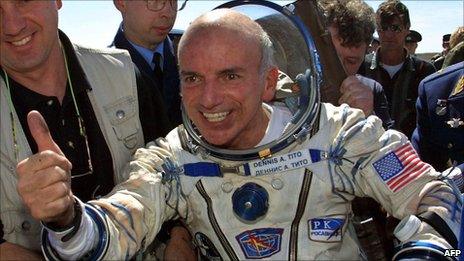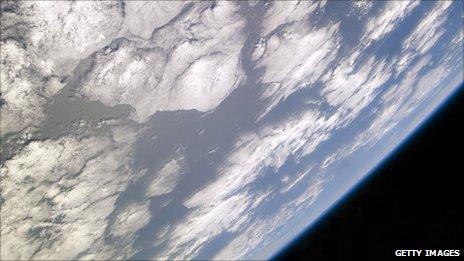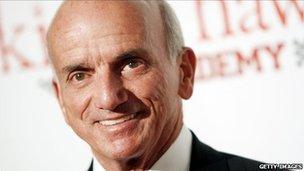World's first space tourist 10 years on: Dennis Tito
- Published

Dennis Tito's jubilant return to Earth: "I just came back from paradise!"
Ten years ago, US multi-millionaire Dennis Tito became the world's first-ever space tourist.
He is said to have paid $20m for his eight days in space.
Mr Tito blasted off on 28 April 2001, but only after a struggle to get anyone to take him - the US space agency Nasa refused on the grounds that he was not a trained astronaut, so it was the Russians who facilitated the trip.
To date, only six people have followed in his footsteps - paying for a ticket to orbit in space.
But 10 years on, the lure of making space tourism more accessible to the masses is just as strong.
Virgin Galactic hopes to take fare-paying passengers into space in around two years time, and a Russian company has even announced plans for a hotel in space.
On the tenth anniversary of the flight, Dennis Tito reflected on his eight-day holiday in space for BBC World Service.
Dennis Tito
There was absolutely no fear. I was so excited and so were my crew mates.
We were going to be in space, and we thought of nothing else, but the success of that mission.
Watch: Dennis Tito arrives at the International Space Station
So there was absolutely no apprehension - it was just a really good, euphoric feeling that finally the day had come.
It was not a shuttle, it was a space capsule; we were literally elbow-to-elbow.
The countdown began, and it went on schedule to the second.
It was a little surprising when lift-off occurred - I thought it would be much more rigorous; you could barely feel it, and you could not hear it.
When I witnessed a launch from the outside, even a mile away, there was a huge sound.
But we heard nothing of that within the space craft.
'Like flying'
As we lifted off and the fuel began to burn, the vehicle accelerated and it kept on accelerating, and then you felt just a gradual build up of G-forces.
Eight minutes and 50 seconds later, you experience your last of the three-gs, and then zero-gs when the engine shuts down - that is the most spectacular moment of the entire flight.
At burn out you become weightless; there are pencils that are hung from strings in the cabin, and at orbit insertion, those pencils start to just float.
And then looking to my right, out of the window, I could see the blackness of space, I could see Earth, and the curvature of Earth, and the sight of Earth from space was just spectacular.
I cannot ever duplicate that euphoric feeling that I had at that moment.
For me it was a 40-year goal. Often achieving a major goal in life occurs slowly, but this was instant - it was just at that precise moment.
It was once we got out of the space suit that we were able to float around and experience weightlessness.
It is really extraordinary, because there is nowhere on earth that we - or any of our ancestors in the entire history of evolution - experience that.
It was a wonderful experience; the feeling of floating is just unbelievable. Moving around is not difficult and you learn very quickly.
When we were on the International Space Station we had more room - you would push off from one area, very gently, and you would fly to another area.
It was like flying, and that was a lot of fun!

Dennis Tito said he could not duplicate the feeling of seeing Earth from space for the first time
Vivid Earth
It took two days of orbiting the Earth, 16 orbits a day, before we caught up with the station.
There were three crew members who were there for about two months as part of the long-term crew, so they don't see many human beings, and they welcomed us with open arms.
I think we have a much better view of the Earth from the International Space Station.
The port hole that we would actually look out at the earth was through the floor, so I was always looking at earth.
Then we had some port holes that looked out to the side, and we could see the edges of the Earth - so we had two different kinds of views.
We would go from one to the other, and I would spend most of the 45 minutes - which is half of one orbit - and be either videotaping the view, or just sitting for 45 minutes, peering out, listening to opera, and just enjoying the experience.
The images are vivid in my mind. I continue to enjoy it every day!
It went very quickly and probably the most disappointing thing for me was after a total of eight days in space, I had to return to Earth.
I would have happily stayed up there for months!
For me, there was very little transition from the space flight to Earth.
Within 48 hours I was actually back to my running - I ran a couple of miles.
With Nasa, there was a strong feeling that my flight shouldn't take place. And I think it's somewhat understandable, it was the first truly private space flight.
And I think that they were concerned, number one, about me being a private citizen; and number two, that my age may not have qualified me.
They had probably some reason to be concerned.
Space future
I hope that tens of thousands of people can experience what I experienced, for 5% of the cost.

"I continue to enjoy it every day": Dennis Tito 10 years on
I believe there will be a time, it may take 10 or 20 years, where the cost for flying in orbit might be as low as a million dollars in today's money.
A million dollars is certainly a lot of money, but there are many millionaires in the world today, and I know people that would spend their last penny to have this experience.
I often thought that if I did spend my last penny, I could live on social security for the rest of my life and still be happy, because I'd achieved what I wanted to achieve.
It was a sense of completeness - from then on, everything is a bonus. And the last 10 years, everything since then, has been just extra.
And I think I am one of the happiest humans alive because of that.
- Published31 March 2011
- Published12 January 2011
- Published30 September 2010